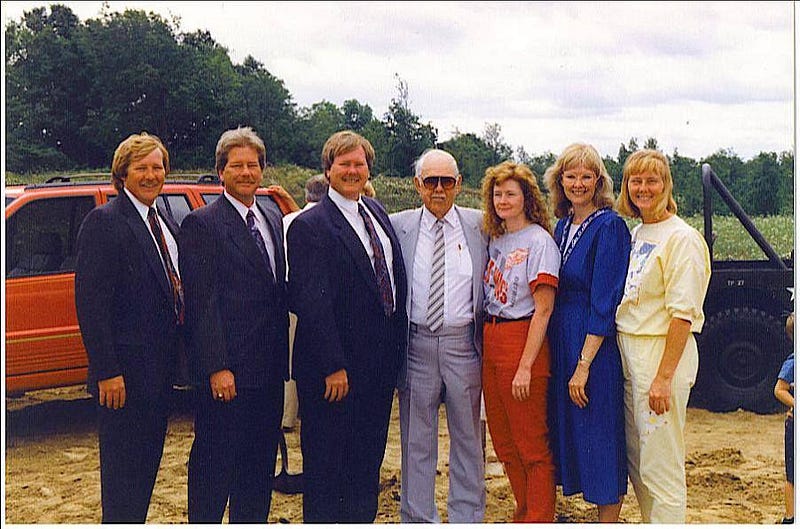Why do we engage the disciplines of spiritual practice?

I will never forget the experience of going to work for my dad. I was pretty excited because my name was on the building and I assumed that I would get to work some cushy easy job and make the big bucks.
I was very, very wrong.
The first summer that I worked at Rose Jeep/Eagle I spent three months cleaning the shelves in the Parts Department. Every day I worked I would leave covered in black grime from head to toe. It was an exhausting, boring, dirty grind.
The second summer that I worked at the dealership I painted the lifts in the service center a bright yellow. It was again, a boring dirty experience.
The third summer I took a step up in the world. I became a porter. Since I couldn’t drive yet, it meant that I spent my days in a small garage behind the dealership cleaning cars. I would prepare them for delivery or detail a customer’s car after service.
All along I was also responsible for washing the windows, sweeping, and mopping floors. The first time I mopped my dad said, “Clearly you’ve never been in the Navy, that son, is not how you mop a floor.” I also learned from my Grandpa Rose that only an idiot would allow plants to touch a wall or window because whichever leaves are touching would die. “Danny, don’t be an idiot, you’re a Rose.”
I think at some point my dad knew I was growing frustrated with these jobs. He has an intuition for reading people and seeing into them and knowing what they need to hear. I think that’s what made him a great salesman.
One day we were “walking with purpose” (another lesson learned at the dealership) to another task that I was about to be assigned and he said, “Son, do you know why you’re doing all these things?”
“No.” I responded with that teenage churlishness that I’ve now discovered is apparently a genetic trait within Rose men.
“Someday, I hope, this place will be yours. There will be people who you have to tell to do jobs that nobody wants to do. When you do, you have to be able to say, ‘I know you don’t want to do this. Neither did I. But, these jobs have to be done. I did them and I need you to do them now.’ Son, when your name is on the building you work twice as hard for half the money. People will never think you do. Watch at the end of the day. Most of our employees gather around the time clock to punch out 15 minutes before we close. The people whose name is on the building are still at their desks, still on the phone, and still with customers. Why? Because, our name is on the building.”
I started watching. It was true. All of it. My Grandpa Rose never entered the building without trash from the parking lot in his hands. Why? Because his name was on the building.
In a very real sense my brothers, cousins, and I were freely given an opportunity to make money and to have jobs. But, we couldn’t just pretend to work. We had a responsibility to work hard and honor the name.
When it comes to our faith, we have been given everything. Grace demands that we bring nothing to the table. We don’t deserve to be redeemed, rescued, and reconciled. Yet, God has done that. Christ has brought about this reconciliation through his self-sacrifice. We offer nothing and we get everything.
Peter writes,
So don’t lose a minute in building on what you’ve been given, complementing your basic faith with good character, spiritual understanding, alert discipline, passionate patience, reverent wonder, warm friendliness, and generous love, each dimension fitting into and developing the others. With these qualities active and growing in your lives, no grass will grow under your feet, no day will pass without its reward as you mature in your experience of our Master Jesus. Without these qualities you can’t see what’s right before you, oblivious that your old sinful life has been wiped off the books. (2 Peter 1:5–9, The Message)
The “how” of growing and building these qualities in our lives is what spiritual practice is meant to do.
Over the next few posts, I will unpack some of these practices. They fall into two categories that Dallas Willard refers to as, “disciplines of abstinence” and “disciplines of engagement.” (pg 158, Spirit of the Disciplines)
The disciplines of abstinence are solitude, silence, fasting, frugality, chastity, secrecy, and sacrifice. (These will be the subject of the next post.)
The disciplines of engagement are study, worship, celebration, service, prayer, fellowship, confession, and submission.
Willard writes about the disciplines, “A discipline for the spiritual life is, when the dust of history is blown away, nothing but an activity undertaken to bring us into more effective cooperation with Christ and his Kingdom. (pg 156, Spirit of the Disciplines).
To is to continue to grow into our Christ-likeness. As we do, we learn to love ourselves more truly which frees us to love our neighbor and even our enemy.
Originally published at https://danielmrose.com on December 18, 2019.